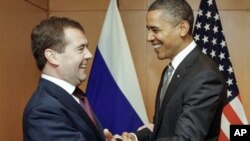Russia spent much of 2010 trying to mend fences with the West. It settled a big border dispute with Norway, and normalized relations with Ukraine, after a pro-Kremlin leader took over. But Russia's biggest change is with two big adversaries: Poland and the United States.
The men in the Kremlin do not smile easily. Soviet Premier Nikita Khruschev banged his shoe at the United Nations. Andrei Gromyko, Soviet foreign minister, was known in the West as "Grim Grom" or "Mr. Nyet."
But this spring, Russia's President Dmitry Medvedev, unveiled a new look – a friendly face to the West. He told a European reporter: "I would like to see Russia smiling, and taking the face of a young, modern person."
Oil was on its way back to $90 a barrel. But foreign investment had not returned after Russia's 2008 invasion of Georgia. Russia's group of allies – Belarus, North Korea, Venezuela and Zimbabwe – was lampooned as 'the losers' club.'
China and Russia switched economic places. Konstantin von Eggert, a Moscow political analyst, increasingly hears Russians worrying about China's relentless rise.
"Another factor is the growth of Chinese economic and political and military might on Russia's borders," said von Eggert. "China squeezes Russia out of Central Asia. It increasingly shows that Russia is its junior partner."
Modernizing alliances
Russia's leadership took a hard look at failed efforts to restore superpower glory. Downsizing ambitions, they chose a pragmatic slogan – "modernizing alliances."
Carnegie Moscow Center Director Dmitri Trenin is writing a book that explores 'post-imperial Russia'
"What Russian leaders has also done is essentially tell the foreign ministry people that simply supporting a crumbling image, a crumbling façade of Russia, the great power, was not enough," Trenin said. "So the mission of Russia's foreign policy was to reach out to countries that could be external modernization sources for Russia."
Russians complain that China sees Russia as a raw materials supplier. In contrast, Europe sees Russia as a frontier for industrial investment. But two obstacles can block full European cooperation – the United States and Poland.
Mutual cooperation
Moscow's reset with Washington is real.
It survives challenges Russian officials once called "provokatsiyii."
The unveiling of a Russian spy ring three days after President Medvedev's visit to Washington last summer; the deportation from Bangkok to New York of Russian arms dealer Victor Bout; and the post-election surge in Republican opposition to the New START treaty.
Keeping an eye on the prize, Russia cancelled the sale of anti-aircraft missiles that were to protect Iranian nuclear facilities. In return, Washington helps Russia enter the World Trade Organization, an event expected to bring more foreign investment. Washington protects Russia's southern flank by bolstering Afghanistan and keeping radical Islam from spilling into Central Asia.
"The Russian political class, Russian leadership, imagine with horror – with creeping horror – what's going to happen when the international coalition headed by the United States pulls out of Afghanistan," said von Eggert. "Russia has porous borders with Central Asia, and if there is a Taliban spillover into places like Kyrgyzstan, Tajikstan or Uzbekistan, that is going to hit Russia very badly."
Better relations with Washington unlock American investment for Russia. Pepsi is buying Russia's largest dairy and juice company – the largest acquisition ever by a U.S. company in Russia.
Stumbling block
Poland also blocked full Russian access to European Union.
A big stumbling block was Katyn, the Russian forest where Stalin's secret police murdered thousands of Polish prisoners during World War II. On April 7, the Prime Minister Vladimir Putin reached out to Poland, praying with Polish Prime Minister Donald Tusk at a memorial in Katyn.
Three days later, tragedy stuck. A Polish government plane carrying the nation's president and 95 other dignitaries crashed in fog near Katyn. President Medvedev persevered with the outreach, attending the funeral in Warsaw, opening the crash investigation to Polish participation, and engineering a Russian parliament vote officially blaming for Stalin for Katyn.
Then last week, President Medvedev turned his wide smile on the Poles in a state visit to Warsaw, the first by a Russian in almost a decade.
He decorated Poland's anti-Soviet film director Andrzej Wajda with the Russian People's Order of Friendship. Wajda's 2007 film, Katyn is about the World War massacre, which took the life of his father, a Polish cavalry officer.
Courting the West
After the ups and downs of 2010, President Medvedev and Prime Minister Putin are sticking to courting the West. Pavel Felgenhauer, a military analyst, cautions that it will take years to erode mutual mistrust.
"This reset of relations with Poland is going very nicely on the public relations kind of part of it," Felgenhauer said. "In the basics the relations are still very edgy."
But with China rising fast in the east, Russia is determined to shore up its ties in the west.




